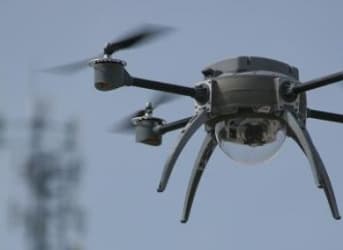These days drones are catching a lot more attention than from just hobbyists and areal photographers. Even the Secret Service announced plans recently to fly Unmanned Aircraft Systems into otherwise restricted airspace in and around Washington D.C. during the wee hours of the morning. Why? To discover where potential vulnerabilities are and plan ways to disarm hostile craft.
In 2013, the Michigan State Police spent nearly $160,000 on an Aeyron Sky Ranger and have been training for over a year on how to use it. They say applications could include multi-vehicle accident investigations, assisting in finding missing people, dealing with disasters and emergencies and conducting clandestine surveillance. Related: The U.S. Will Spend $5 Billion On Energy Research In 2015 – Where Is It Going?
The oil and gas industry has been jumping on the drone bandwagon as well. However, commercial regulation is still an unanswered question. Last summer, the Federal Aviation Administration (FAA) issued BP a permit to fly drones along pipeline routes in and around Prudhoe Bay, Alaska. BP says their commitment to the North Slope includes monitoring drilling sites and trying to avert problems before they turn into disasters.
The San Antonio Express News reported last year that drones could impact the Texas economy to the tune of $6.5 billion dollars over the next ten years, while the Association of Unmanned Vehicles International puts the number at closer to $8 billion. Texas A&M University’s Corpus Christi campus was named one of six FAA test sites for drone research, a move assisted by former Governor Rick Perry before leaving office. Related: Climate Security Pits US Military Against Congress
Exactly how drones could benefit the oil and gas industry is still on the drawing board. Of primary concern now is early detection of potential methane leaks. With new and stricter restrictions looming over the industry the upcoming decade, if drones could scan drilling sites and pipelines with sensors to pick up excess levels of methane, that one application could save the industry potentially billions of dollars in fines, plus better implementation of new standards.
NASA is even on board with a new areal methane detection technology. The Jet Propulsion Laboratory added methane sensors to the Mars Rover. This was an extension of other research the JPL has been conducting in monitoring atmospheric gasses, in addition to interplanetary exploration.
The Laboratory, working in conjunction with Chevron Energy Technology Company, developed a working prototype drone that can detect ultra-sensitive parts-per-billion data to locate potential sources of escaping methane, a technology that could prove invaluable to upstream and midstream companies alike. Related: An Oil Company Has Beat Amazon’s Drones Into The Skies
Meanwhile, the FAA is in the midst of a 60-day public response phase before it finalizes new regulations on drones. Up for discussion is a 500-foot ceiling on drones during daylight hours. Also, a new FAA certification – Licensed Drone Operator – is an integral part of the new proposal. Another issue for commercial and governmental usage is nighttime operations. Law enforcement, for example, is seeking an exemption from the daylight hours-only proposal.
With the advent of such a fascinating technology still in its infancy, certainly tremendous benefits are possible for an industry that is constantly under the scrutiny of public opinion. Perhaps these stealthy spies in the sky could help the industry find and catch potential problems faster, thus adding a substantial and needed boost to its image and reputation.
By Thomas Miller for Oilprice.com
More Top Reads From Oilprice.com:
- Flying Robots Could Change The Resource Business (Seriously)
- Utilities Stumbling Into A New Dawn
- An Emerging Cure For Fracking Wastewater

















